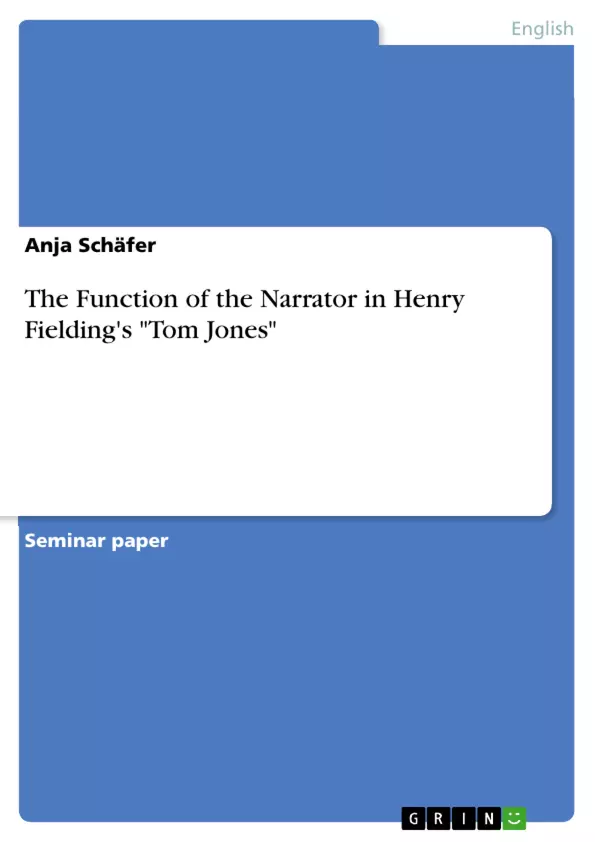The following essay about Henry Fielding's novel Tom Jones. The History of a Foundling (1749), deals with the author's contribution to the development of the genre "novel", which had to prove itself as a potentially literary form in the eighteenth century century. By this time, prose fiction had to enforce its claim as a worthy pursuit and the form of the novel had to stand up to the dominant genres of verse and drama. Fielding was one of the first authors, who resolved to write fiction and with his humorous style of writing he revolutionized eighteen-century-literature.
In this context, the function of the narrator plays an important role, for he is responsible for the success of Tom Jones and for many complications of the plot. In the introductory chapters, preceding the individual Books of the novel, he presents himself as a deep thinker, discoursing on the philosophy of writing and foregrounding himself by intrusive comments and self-glorifying statements. What is told, the content of his story, seems to come second and the process of writing is centred as the “real” subject of the text.
Besides the narrator's self-interest, his method of narrative selection causes much confusion, for he is constantly withholding significant information from the reader. In doing so, Fielding is leading his audience knowingly into the wrong direction, forcing it to make its own judgements and interpretations rather than trusting blindly in his guidance. The main function of the “games” the author is playing with his readers, is to strengthen their engagement with the text, forcing them to reconsider previous interpretations and judgements. Thus, the reader's full attention is required throughout the whole novel and he is forced to participate in its progress. As a result, a constant adherence of suspense is guaranteed in all books of Tom Jones, regardless of its length.
Table of Contents
- Introduction
- The Narrator
- Introductory Chapters and Self-Interest of the Narrator
- Creating Suspense
- Narrative Selection
- Withholding Information
- Narrator-Reader Relationship
- Introductory Chapters and Self-Interest of the Narrator
- Plot
- Comic
- Irony
- The Man of the Hill
- Conclusion
Objectives and Key Themes
This work analyzes the role of the narrator in Henry Fielding's Tom Jones, exploring how the author uses narrative techniques to engage with readers and present a nuanced view of reality. The author examines the unique blend of first-person and omniscient narration, highlighting the narrator's self-awareness and the deliberate manipulation of information. The work also delves into the broader context of the novel as a new literary form, exploring Fielding's contributions to the development of the genre.
- The multifaceted nature of the narrator in Tom Jones
- The significance of the introductory chapters and their impact on the reader
- The role of irony and comedy in Fielding's narrative strategy
- The relationship between the narrator and the reader
- The impact of Fielding's work on the evolution of the novel
Chapter Summaries
The introductory chapter provides an overview of Fielding's Tom Jones and its unique blend of realism and fictional elements. The author positions the novel as a "Heroic, Historical, Prosaic Poem" that aims to depict the complexities of human nature. The chapter also discusses Fielding's contribution to the development of the novel as a literary form.
The following chapters focus on the role of the narrator in the story. The author explores the narrator's self-awareness, their manipulation of information, and their interactions with the reader. The chapter on "Introductory Chapters and Self-Interest of the Narrator" specifically investigates the narrator's deliberate use of the introductory chapters to establish their authority and to create suspense. The chapter on "Narrative Selection" examines the narrator's strategic withholding of information to create a sense of intrigue and to control the reader's understanding of the story.
The chapter on "Plot" delves into the use of comedy and irony in Tom Jones. The author analyzes how these elements contribute to the novel's humor and satire, highlighting the ways in which Fielding uses these techniques to expose the follies of society.
Keywords
Key terms and concepts that define this work include: narrator, first-person narration, omniscient perspective, introductory chapters, narrative selection, irony, comedy, realism, fiction, novel, genre, Tom Jones, Henry Fielding.
- Quote paper
- Anja Schäfer (Author), 2007, The Function of the Narrator in Henry Fielding's "Tom Jones", Munich, GRIN Verlag, https://www.grin.com/document/198255



